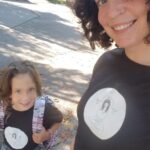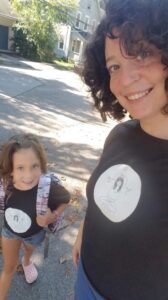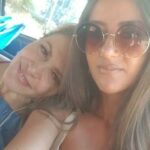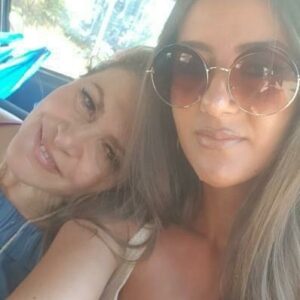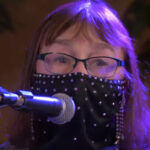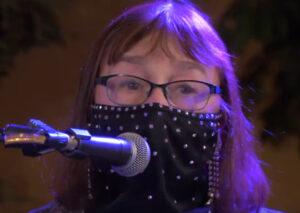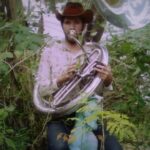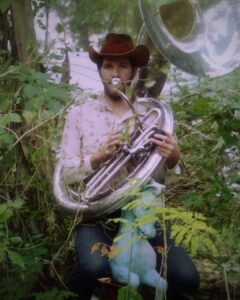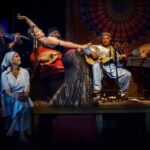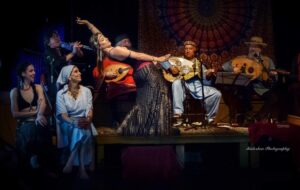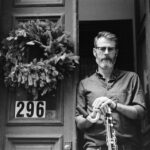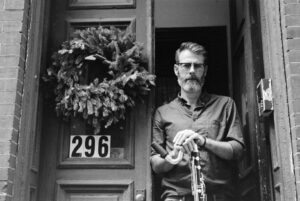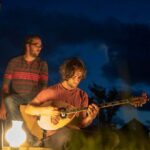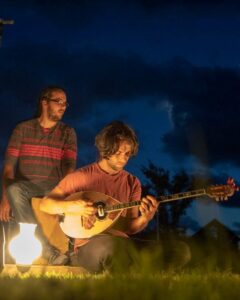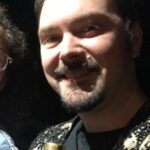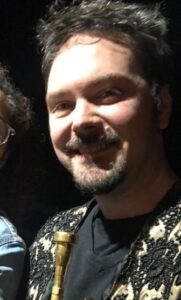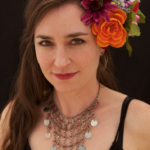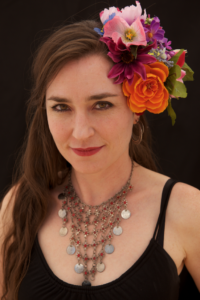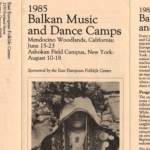
Inspired by conversations during Kafana in the 2021 East Coast Virtual Camp, Sandy Ward wanted to follow up by sharing her memory of the way camp auctions began. She had been “in the room where it happened” but until now had not written about this experience. The following is an expanded version of the original that was posted to the EEFC listserv on August 25, 2021.
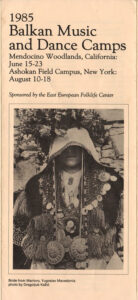
EEFC Workshop brochure, 1985
It was in July 1985, at Balkan Camp in the Mendocino Woodlands. That camp was at the Camp Two site, further in along the Woodlands road than the site EEFC currently uses, Camp One. I loved the Camp Two site, which was spread out and less hilly, with a bridge over a gentle stream that meandered through camp. There was only ONE lodge, though, which had to double as dance hall and dining room, requiring much moving of tables and benches every day.
If you were there in 1985 you might have witnessed the origin of EEFC auctions, though only a few people attended the very beginning. Mark Levy and Carol Silverman, troubled by the tight finances (debt?) of that camp, announced that they were willing to auction off albums from their personal record collections to raise money to save camp. It seemed a very sad situation . . . but an opportunity for others to acquire some special recordings. Thus, at an appointed time (one afternoon about an hour before dinner), a small group gathered in a corner of the dining room. Women from Carol’s singing classes were the most interested. I was a curious bystander. None of us had any idea how this would go. NONE of us could have guessed the repercussions of this auction offer.
Edging up prices
I remember the early bidding, with women edging the prices up gradually, e.g., 25 cents at a time—intent on getting bargains while securing much-desired Balkan recordings. I think there were only five or ten people present. Then in walked a couple of guys, Atilla Aydin and his buddies. They stood at some distance and randomly called out higher bids, shocking the women, who then proceeded to add 25 cents or so to win back each desired album. Again, the guys outbid them, doubling prices and laughing. Atilla commented at one point that they simply wanted to give back to camp some money they’d won in late-night poker games that week! It was obvious that they didn’t care which items they bought. (And later, I heard, they did give the albums to the women who REALLY wanted them.)
Interrupting this auction process was a spontaneous offer from a member of the kitchen crew. He wanted to help by auctioning a “breakfast in bed” for a future morning. That silly idea was ignored, brushed off as irrelevant to the serious little group bidding for record albums.
A second auction
The record auction did raise money. The total amount was cheerfully announced at dinner to the whole camp, drawing applause. Then the same kitchen crew person tried again. This time he added some theatrics, jumping onto a bench and clanging a metal spoon on a large metal pot or frying pan. “Ladies and gentlemen!” he shouted, as he announced that “the kitchen crew” would be auctioning “Breakfast in Bed for Two!” for Saturday morning. The auction that followed—immediately—was probably aided by the wine bottles on each table (perhaps strategically set there by the kitchen crew?).
What an EXPERIENCE that second auction was! My cheeks hurt afterwards from laughing so hard! I was glad for a break after the hour-long hilarity of the bidding wars for WHO was going to win that breakfast and WHAT would be added to the breakfast service to add value (increasing bids). Early on, someone asked, “Will there be eggs Benedict?” No, the kitchen crew replied: just regular breakfast served to the winner. Someone offered a higher bid IF there would be eggs Benedict. Kitchen crew: “There will be eggs Benedict!” “Will the breakfast be served by the camp director?” (Whispered conferencing with Mark Levy.) Yes! “Will he be wearing a hula skirt?” asked someone else (who probably had such costuming handy). Yes! And so it went, adding many, many details.
Even I, a silent observer, felt moved to contribute. I approached the auctioneer (kitchen crew guy still up on the bench) and whispered that I could take photos of the event. “Souvenir Photographs” were thus added to the enticements.
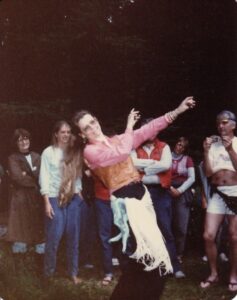
Melissa Miller dances at the breakfast event, June 1985
“Will there be dancing girls?” elicited strong positive reaction from the crowd, and a flurry of whispered conversations until dancers were confirmed. “Will there be live music?” The crowd erupted with calls for “Zurna! ZURNA!” and pounding of fists on tables! (Really? For BREAKFAST on Saturday morning? Campers typically preferred to sleep late that morning.)
I don’t remember all the folks who bid for this, but I do remember, of course, that Bill Cope won. Good $$$ was raised for camp, and we’d had good fun in the process. It seemed time to resume our scheduled (somewhat delayed) activity for that evening. Oops, not yet . . . . The auctioneer’s voice boomed out again, “Ladies and gentlemen! It has just been announced that Bill Cope does NOT have a date!” That launched a third auction, with a whole cast of characters bidding to be Bill’s date for the Saturday “Breakfast in Bed for Two.”
The suspense in that third auction was terrific. Which lovely young wannabe could outbid the others? I recall that one end of the dining hall was relatively quiet, with few bidders, while the other end, around Bill, was very lively. After a while a surprising new voice (and higher bid) came from the quiet end. Bill Cope stood up, and peered in that direction, straining to discover the bidder. Up stood an older woman, Carolyn Brent, waving a scarf and calling out “Hi Bill!” in a flirtatious manner. Well! None of the younger bidders could match Carolyn’s offer, but they quickly formed an alliance, and after consultation with the auctioneer about rules, became known as The Corporation. (The auctioneer said that Bill’s doctor had been consulted, and had given approval for up to 10.) That changed the game. It became Carolyn vs. The Corporation, and it was quite a show. Balkan Camp was the final winner, of course, with more $$$ donated.
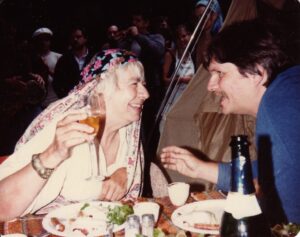
Carolyn Brent, Bill Cope and the eggs Benedict at Bill’s tent, June 1985
I’m still in awe of the way the EEFC community responded, with such creativity and spirit. Definitely saved camp financially, though probably disrupted some activities that had been intended (especially sleeping in Saturday). The Saturday morning event grew, and deserves its own story-telling. I recall watching an anthropologist, or was it an ethnomusicologist? creeping into the scene with recording equipment. (Was that fake or real?) Very early on, I went into the kitchen to offer help carrying items to Bill’s tent, if needed. I happened to overhear a key question from a corner of the kitchen, “How do you make eggs Benedict?” I didn’t stay for the answer. I was eager to return to the scene to watch for the ceremonial parade that would carry Carolyn (on a chaise longue held shoulder high) from her meadow campsite to Bill’s tent. Yes, there were zurnas and dancing girls, as promised. Later, Jerry Duke did impressive bellyrolls, and a young son of one of the campers rolled up his own t-shirt and mimicked Jerry’s rolls (totally surprising his mom). There were many surprises that morning. Lots of fun. A wonderful memory.
I bet many people in the EEFC community have memories of that Saturday scene, and the auctions that led up to it. Perhaps some of you can remember names I’ve forgotten. I did take some photographs. [See https://sward.smugmug.com/Music/Balkan-Music-Camp/Old-photos/i-gwqFLZh/A] I hope you’ve enjoyed this bit of history.
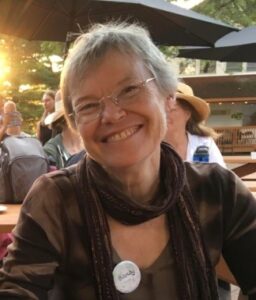 Sandy Ward has been attending week-long Balkan camps since Sweet’s Mill days in 1974. She began folk dancing in college in the 1960s, and began tapan lessons at Mendocino in 1978, after brief attempts at gaida (1974) and kaval (1975). She now lives in Holyoke, Mass., and looks forward to future EEFC camps.
Sandy Ward has been attending week-long Balkan camps since Sweet’s Mill days in 1974. She began folk dancing in college in the 1960s, and began tapan lessons at Mendocino in 1978, after brief attempts at gaida (1974) and kaval (1975). She now lives in Holyoke, Mass., and looks forward to future EEFC camps.
